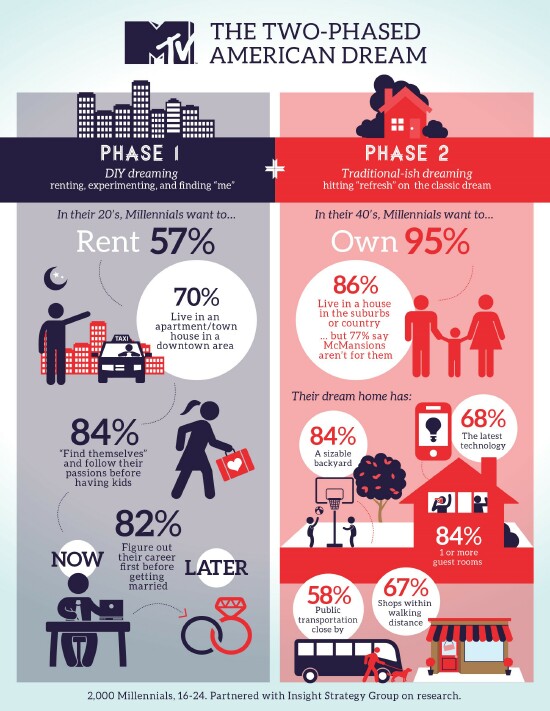Millennials and The American Dream: It’s Not Dead, Just Different and Delayed -- Alison Hillhouse, MTV Insights

Millennials and their “American Dream” -- is it dead? Not quite.
Traditionally, the American Dream was conceived as “opportunity for all” regardless of social class. In the mid-1900s, the American Dream morphed to include physical manifestations such as a house, picket fence and two kids in the suburbs.
Today, the nomenclature of the “American Dream” is a struggle for many Millennials, who pride themselves on uniqueness and reject the “one size fits all” approach that it implies. But theory aside, there does seem to be a universal dream of this generation that is consistent across race, gender and geographical location. It’s just shape-shifted yet again to include a penchant for pursuing passions first and hitting life milestones later.
As found in a recent MTV study, “Millennials and ‘Merica,” that surveyed 2,000 16-24 year olds, this new two-phased approach lands in a place that’s starkly similar to the American Dream of their parents, simply divergent in the path and timing of how to get there.
Whether you’re a marketer or a parent, here are four truths to keep in mind as to how this generation is dreaming:
Truth #1: Millennials prioritize the pursuit of passion over money.
Young people are prioritizing the pursuit of passion over money with 83 percent agreeing “it’s fine to make less money than your parents, as long as you are pursuing your passions.”
In addition, 68 percent agree they’d “rather have a flexible job than make a lot of money” (rising to over 7 in 10 when we look at just 19-24 year olds). Moreover, when asked to prioritize the top elements of their personal American Dream, “Making a lot of money” didn’t even make the top five:
#1 Being happy
#2 Having a family
#3 Having a job you love
#4 Owning a home
#5 Being debt-free
#6 Making a lot of money
They don’t deny that money is important to live a comfortable life, pay off loans, travel and have meaningful experiences. But they question the level of wealth and “stuff” they need to be happy. In fact, 71 percent claim they do not need as much “stuff” as their parents (and they might be getting this message from parents with 72 percent of Boomers agreeing they “might have sacrificed too much for financial success”).
Millennials want to bring back the middle class and they are okay being part of it. It might surprise some that 90 percent agree “middle class is fine by me, as long as I can pursue my passions in life.” And only 11 percent believe they need to be in the “top 10 percent” to feel financially successful.
Truth #2: Millennials conceptualize a two-phased American Dream: Find yourself first, family later.
Millennials want it all -- just on their own time. An overwhelming 84 percent agree “it’s important to find yourself and follow your passions before getting married or having kids.” They are fully aware that they are taking more time to reach adulthood, with 81 percent agreeing “my generation is taking more time to grow up.” And 67 percent say “for my generation, my 30s are my new 20s.”
But that doesn’t mean they’ve crossed marriage and kids off the list. As shown above, “having a family” is #2 on their list of life priorities -- it just happens in “Phase 2” of their Dream.
Truth #3: The suburbs aren’t dead – they are just delayed and downsized.
Yes, Millennials dream of city life and want to live out their 20’s in a fast-paced, urban environment. In their 20’s, what we call “Phase 1” of the 2-phased American Dream, the research shows nearly 6 in 10 would prefer to rent, and 7 in 10 would prefer to live in an apartment or townhouse in a downtown area.
But when asked to imagine their 40’s, 95 percent said they will prefer to own a home, including 86 percent who will want to live in the suburbs or a rural environment. A generation that’s nostalgic for their idyllic childhood (or the idyllic childhood they saw on TV) wants the house, the yard and the cul-de-sac. But a “downsized” version might do just fine as 77 percent agree “a McMansion isn’t for me; I’d be happier with a smaller home.”
Truth #4: Nonetheless, achieving the American Dream feels harder than ever.
Millennials don’t know how their dream will shake out -- 81 percent say “achieving the American Dream is harder than ever” and 82 percent agree “hard work used to be enough to achieve the American dream, now you need luck.”
Yet this optimistic generation continues to dream with their own unique spin. As one Millennial said to us: “I think people still want the same things that they did in our parents’ times, but now the methods of achieving it are much more varied. The modern American dream has a lot more to do with personal fulfillment than doing what society expects of you.”

Alison Hillhouse is Vice President of Insights Innovation at MTV, where she focuses exclusively on understanding the behaviors and psychological underpinnings of Millennials. She decodes everything from the intricacies of fandom culture to high school cliques to the creative ethos of the generation. The insights her team uncover help MTV fulfill its research imperative for ³radical audience intimacy. Prior to MTV, Alison spent 12 years at advertising and public relations agencies such as JWT, crafting strategy and developing campaigns for brands such as Xbox360, Jose Cuervo and Huggies.
understanding the behaviors and psychological underpinnings of Millennials. She decodes everything from the intricacies of fandom culture to high school cliques to the creative ethos of the generation. The insights her team uncover help MTV fulfill its research imperative for ³radical audience intimacy. Prior to MTV, Alison spent 12 years at advertising and public relations agencies such as JWT, crafting strategy and developing campaigns for brands such as Xbox360, Jose Cuervo and Huggies.
Check us out on Facebook at MediaBizBloggers.com
Follow our Twitter updates at @MediaBizBlogger
The opinions and points of view expressed in this commentary are exclusively the views of the author and do not necessarily represent the views of MediaBizBloggers.com management or associated bloggers. MediaBizBloggers is an open thought leadership platform and readers may share their comments and opinions in response to all commentaries.
Image at top courtesy of freedigitalphotos.net.


